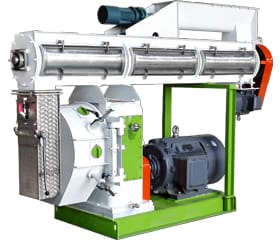The highest utilization rate of this fish feed can reach 98%
Extruded aquatic feed is a kind of high-quality environmentally friendly feed with low pollution, less waste, high efficiency and high conversion rate. The use of extruded feed is an important means to produce high-quality and safe animal products and ensure human health. It is also the development trend of the feed industry in the future, and it is the inevitable trend of the development of the aquatic feed industry with the theme of green and environmental protection. Aquatic extruded feed is entering an era of "crazy" expansion. Major feed companies have entered this sector one after another. However, the acceptance of extruded feed by farmers is not as fast as its promotion. Today Richi Machinery will take everyone to fully understand the advantages of extruded feed for fish and shrimp.

1. Advantages of extruded feed
(1) Convenient breeding management
Since the extruded feed can be suspended on the water surface for a long time, there is no need to set up a feeding table when feeding the fish, but it needs to be fed at a fixed point. Aquatic animals need to swim to the surface of the water when eating, so you can directly observe their eating, adjust the feeding amount in time, and understand the growth and health of the fish. Therefore, aquatic extruded feed is more conducive to scientific breeding and management, which not only saves a lot of time, but also improves labor production efficiency. Farmers can calculate the amount of feed fed according to the breeding species, specifications, output, water temperature, feeding speed and other conditions. The feeding speed is fast, saving time and effort, and significantly improving work efficiency.
(2) Reduce the activity of anti-nutritional factors of raw materials
There are many anti-nutritional factors in the raw materials of feed, such as gossypol, saponins and trypsin inhibitors in cottonseed oil, soybean meal and cottonseed meal. Under certain moisture and temperature, these anti-nutritional factors are gradually lost during the expansion process. Some activities, thereby reducing the damage to digestive enzymes, improving the digestion and absorption rate of feed, reducing excrement, thereby reducing water pollution.
(3) Reduce harmful microorganisms
Through the expansion of the equipment, the material instantly expands under high temperature and high pressure to meet the requirements of buoyancy. In this process, high temperature, high humidity and high pressure can kill most harmful microorganisms. The data shows that there are more than 10,000 E. coli per gram of raw material, but there are less than 10 E. coli after extrusion and expansion. At a high temperature of 85°C, Salmonella can be completely extinct, helping to maintain water quality and reduce the impact of adverse environmental factors in aquaculture. At the same time, the feed water content is only 8%-10%, which improves the storage stability of aquatic feeds.
(4) The palatability is strong, which is more conducive to absorption and utilization
The temperature during the processing of pellets is 85°C-95°C, the processing temperature of the extruded material is 120°C-145°C, and the maximum temperature during extrusion and expansion can reach 150°C. The raw material is processed at high temperature for only 8 seconds. After swelling, various microorganisms, eggs and pathogenic bacteria are killed, which improves the quality of feed and reduces animal digestive tract diseases. At the same time, the extruded material can improve the palatability of the feed through high temperature curing, which is more conducive to absorption and utilization.

2. The impact of extruded material on water quality
(1) Good stability
The extruded material has good stability in water and will not dissolve within two hours. The extruded material can save 10%-20% of the material compared with the pellet material. Even some unfinished feed that is left on the water surface can be recycled and dried, which can greatly limit the waste of feed. The extruded material is easy to observe and control, and can reduce or avoid the pollution of the water quality by the powder material and the residual feed, which is very beneficial to the environmental protection and the growth of fish.
(2) Improve storage stability
Due to high temperature, high pressure expansion and drying treatment, the water content of the extruded material is relatively low, usually about 9%, the particle hardness is high, and the stability is good. Therefore, the extruded material can be stored for a long time, is not easy to be wet, not easy to mold, and to avoid the loss of nutrients. The extruded material has very strong water stability (will not separate within 16-32 hours), so there is little pollution to water quality.
3. Attraction utilization rate of extruded material
(1) Good palatability
After extrusion, the granular structure of the extruded material is loose, porous, crisp and tastes good. In addition, the template can be made into holes of different shapes, so that feeds of different shapes and sizes can be made. Because the granular structure of the extruded material is more loose, it can produce feeds for Atlantic salmon, rainbow trout and other special breeding species that require high fat. The fat content of some feeds is as high as 30%-35%.
(2) Higher digestion and utilization rate
Studies have shown that the A-type starch in the feed increases from 13.58% to 81.55% after extrusion. At the same time, it has a higher degree of swelling and is easier to be fully utilized by enzymes. Through the high temperature and high pressure during the puffing process, vegetable raw materials can gelatinize starch and organize protein, which is more conducive to the digestion and absorption of animals, and improves the digestibility and utilization of feed. The digestibility of aquatic feed can be increased by 10% to 35% through extruded processing. For example, the digestibility of raw starch for rainbow trout is only 40%, while the digestibility of starch after curing is more than 60%.
At present, most farmed fish such as carp, grass carp, and crucian have no stomach, and they mainly rely on intestinal absorption. The smaller the feed, the higher the absorption and utilization of fish. In the production process, 95% of the high-grade extruded materials such as sea fish have a fineness of more than 80 meshes. Even for common species such as grass carp, tilapia, and catfish, 95% of the raw materials will have a fineness of more than 60 meshes. The utilization rate of extruded material after crushing is up to 98%, while the utilization rate of pellet material is generally only up to 75%.
4. The principle of extrusion processing technology
Puffing is the use of the extruder and shearing action of the screw and screw sleeve in the extruder to heat up and pressurize the material, and extrude the high-temperature and high-pressure material out of the die hole, so that the volume is expanded due to the sudden pressure drop. Of craftsmanship. Puffing can be divided into two processing methods: dry and wet. Dry puffing does not need to add water to the raw materials. The raw materials are not subjected to tempering treatment before entering the expansion chamber.
The heat generated during the expansion process is all passed through the screw under the action of mechanical energy. The shear plate and the inner wall of the puffing cavity are produced. The structure of the wet extruder is more complicated than that of the dry extruder. The raw material is quenched and tempered before entering the expansion chamber to increase the degree of maturation. In order to strengthen the control of the maturation process, the expansion chamber is also equipped with a device for introducing steam and adding water, to assist heating or cooling.
The typical puffing process is: the crushed and mixed materials are sent to the conditioner to give a certain amount of moisture and temperature. The quenched and tempered mixture material is sent to the puffing bin, and the material is driven by the high-speed rotating screw to pass through different areas. The temperature and pressure of the material gradually increase due to friction, and the pressure control lock between the areas further adjusts the pressure.
Expansion temperature and pressure reach the maximum at the conical spiral origin of the extruder head. The temperature of the material rises to 135-160℃, and the pressure is 15-40 atmospheres. At this time, although the water temperature is higher than 100℃, the pressure is far higher. At one atmospheric pressure, the boiling phenomenon is avoided. Finally, when the material enters the atmospheric pressure environment through the ring die hole, the pressure suddenly decreases and the steam escapes quickly, which causes the material to expand violently.
5. RICHI SZLH-series aquatic feed machine recommendation:
| Model | Capacity | Machine Power | Dia. of Screw |
| DGP40-C extruder machine | 0.03-0.04T/H | Single-phase-6KW | Φ40MM |
| DGP40-C extruder machine | 0.03-0.04T/H | 5.5KW | Φ40MM |
| DGP50-C extruder machine | 0.06-0.08T/H | 11KW | Φ50MM |
| DGP60-C extruder machine | 0.12-0.15T/H | 15KW | Φ60MM |
| DGP70-B extruder machine | 0.18-0.2T/H | 18.5KW | Φ70MM |
| DGP80-B extruder machine | 0.2-0.25T/H | 22KW | Φ80MM |
| DGP90-B extruder machine | 0.3-0.35T/H | 37KW | Φ90MM |
| DGP120-B extruder machine | 0.5-0.6T/H | 55KW | Φ120MM |
| DGP135-B extruder machine | 0.7-0.8T/H | 75KW | Φ133MM |
| DGP160-B extruder machine | 1-1.2T/H | 90KW | Φ155MM |
| DGP200-B extruder machine | 1.8-2.0T/H | 132KW | Φ195MM |
If you want to built one complete pellet production line in your country, pls send the inquiry to us. We will customized design according to your requirement.



